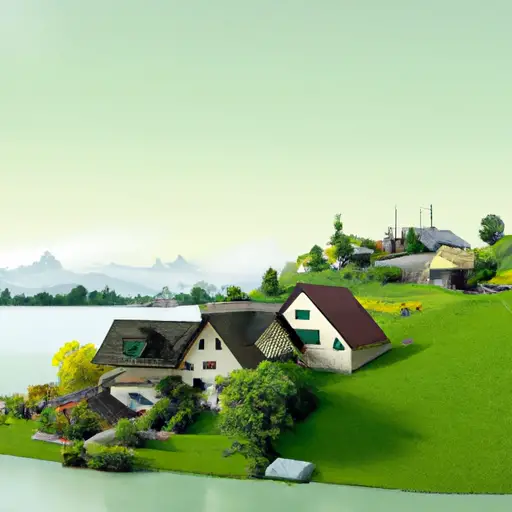Have you ever wondered what it would be like to live off the grid? To disconnect from the bustling city life and find solace in the tranquility of nature? If so, you’re not alone. Many people are drawn to the idea of off-grid living, where they can rely on renewable energy sources, grow their own food, and reduce their environmental impact. In this article, we will explore the advantages of off-grid living, from the freedom to live sustainably to the opportunity for self-sufficiency. Whether you’re considering a complete off-grid lifestyle or simply curious about the benefits, read on to discover more.
Living off the grid offers numerous advantages. Firstly, it allows individuals to reduce their ecological footprint by relying on renewable energy sources such as solar panels or wind turbines. By generating their own electricity, they can minimize their dependence on fossil fuels and contribute to a cleaner, greener environment. Secondly, off-grid living promotes self-sufficiency. With the freedom to grow their own food and raise livestock, individuals can become less reliant on the industrial food system and have more control over the quality and nutritional value of their meals. Moreover, living off the grid often means living closer to nature, which can have a positive impact on mental health and overall well-being.
While there are certainly advantages to living off the grid, it’s important to consider the potential disadvantages as well. One of the main challenges of off-grid living is the initial cost. Setting up a self-sufficient system can be expensive, from installing renewable energy sources to creating a sustainable water supply. Additionally, off-grid living can require more time and effort for daily tasks such as cooking and cleaning, as individuals may need to rely on alternative methods without the convenience of modern utilities. However, with careful planning and resource management, these challenges can be overcome, and the benefits of off-grid living can far outweigh the drawbacks.
In conclusion, off-grid living presents a unique opportunity for individuals to live sustainably, promote self-sufficiency, and connect with nature. While there are challenges to overcome and initial costs to consider, the advantages of reducing one’s environmental impact and embracing a simpler, more sustainable lifestyle are worth exploring. Whether you’re ready to make the leap into off-grid living or simply looking to incorporate some aspects into your daily life, stay tuned for the rest of this article, where we will delve into the topic in greater detail and provide practical tips and insights for embracing the advantages of off-grid living.

Exploring the Advantages of Off-Grid Living
Living off the grid has become an increasingly popular lifestyle choice for many individuals and families seeking a more self-sufficient and sustainable way of life. By disconnecting from the traditional power grid and relying on alternative energy sources, off-grid living offers a myriad of benefits that extend beyond the simple act of reducing one’s carbon footprint. In this article, we will explore the various advantages of off-grid living, ranging from increased self-sufficiency to enhanced connection with nature.
1. Increased Self-Sufficiency
One of the most significant advantages of off-grid living is the increased self-sufficiency it provides. When you are not dependent on external sources of power, such as electricity from the grid, you are forced to find alternative methods to meet your energy needs. This could involve harnessing solar energy through photovoltaic panels, using wind turbines, or relying on bioenergy sources such as wood or biomass. By generating your own power, you can become less reliant on utility companies and have greater control over your energy consumption.
2. Environmental Sustainability
Living off the grid inherently promotes environmental sustainability. By utilizing renewable energy sources, off-grid households significantly reduce their carbon footprint and contribution to climate change. Solar panels produce clean and renewable energy, while wind turbines harness the power of the wind without emitting greenhouse gases. Moreover, off-grid living often goes hand in hand with adopting other sustainable practices, such as composting, rainwater harvesting, and organic gardening. These practices not only benefit the environment but also contribute to a healthier and more sustainable lifestyle.
3. Energy Cost Savings
One of the most tangible advantages of off-grid living is the potential for significant energy cost savings. While the initial investment in alternative energy systems may be higher compared to traditional grid connections, the long-term benefits far outweigh the costs. By generating your own power, you are no longer subject to fluctuating electricity prices and can avoid monthly utility bills. Over time, the money saved can be reinvested in further improving your off-grid infrastructure or used for other purposes such as travel or education.
4. Reduced Dependence on Infrastructures
Living off the grid allows you to reduce your dependence on external infrastructures. In times of natural disasters, power outages, or even economic crises, off-grid households remain unaffected as they have their own independent sources of energy. This provides a sense of security and peace of mind, knowing that you are not at the mercy of external factors that may disrupt the supply of electricity or other utilities.
5. Greater Flexibility in Location
When you choose to live off the grid, you are no longer limited to areas that are connected to the power grid. This opens up a world of possibilities in terms of choosing the location of your home. Remote wilderness areas, secluded mountainous regions, or even offshore islands become potential viable options. This greater flexibility in location allows you to enjoy the beauty of nature and find solace in a tranquil and peaceful environment that may not have been accessible otherwise.
6. Minimal Environmental Impact
Living off the grid inherently minimizes your environmental impact. By reducing or eliminating your reliance on fossil fuels, you are directly contributing to the reduction of air and water pollution. Traditional electricity production relies on burning fossil fuels, which releases harmful emissions and pollutants. By utilizing renewable energy sources, off-grid households do not contribute to the degradation of air and water quality, safeguarding the environment for future generations.
7. Enhanced Connection with Nature
Off-grid living encourages a deeper connection with nature. When you rely on alternative energy sources and sustainable practices, you become more in tune with the natural cycles and rhythms of the earth. You become aware of the weather patterns, the availability of resources, and the importance of conservation. This heightened connection with nature can lead to increased mindfulness and a greater appreciation for the beauty and fragility of the natural world.
8. Improved Air and Water Quality
By living off the grid and utilizing renewable energy sources, off-grid households contribute to improved air and water quality. Traditional electricity production, especially through the burning of fossil fuels, releases harmful pollutants into the atmosphere, contributing to air pollution and climate change. Additionally, runoffs from traditional farming practices and excessive water usage by urban households can contaminate water sources. Off-grid living promotes cleaner air and water by eliminating these sources of pollution and adopting sustainable practices.
9. Opportunity for Skill Development
Off-grid living offers a unique opportunity for skill development and self-sufficiency. When you generate your own power, grow your own food, and manage your resources independently, you acquire valuable skills that can be both empowering and practical. Learning how to install solar panels, maintain a wind turbine, or build a rainwater harvesting system not only enhances your self-reliance but also equips you with valuable skills that can be shared and utilized in various other aspects of life.

Conclusion
Off-grid living offers an array of advantages that extend beyond the financial and environmental benefits. From increased self-sufficiency and environmental sustainability to improved air and water quality, off-grid living provides a unique opportunity to lead a more independent and conscious lifestyle. By embracing alternative energy sources, adopting sustainable practices, and reconnecting with nature, off-grid living empowers individuals and families to create homes that are not only self-sustaining but also harmonious with the environment. So, if you’re seeking a lifestyle that allows you to break free from the constraints of traditional living, consider exploring the advantages of off-grid living.




